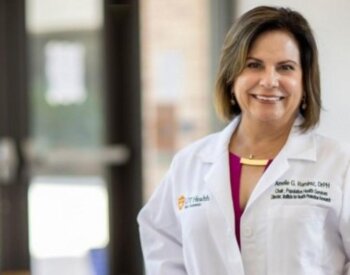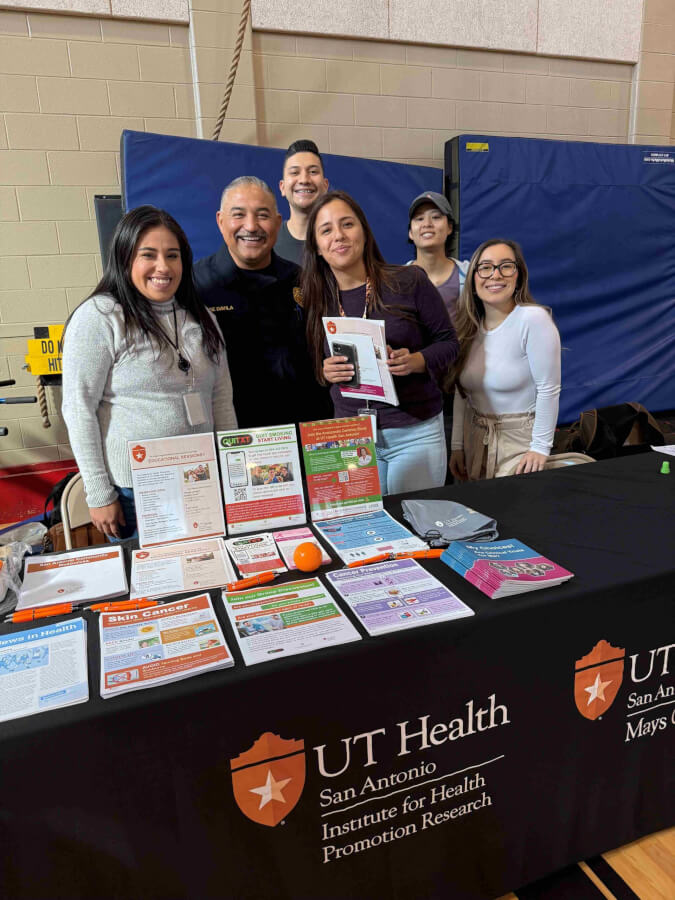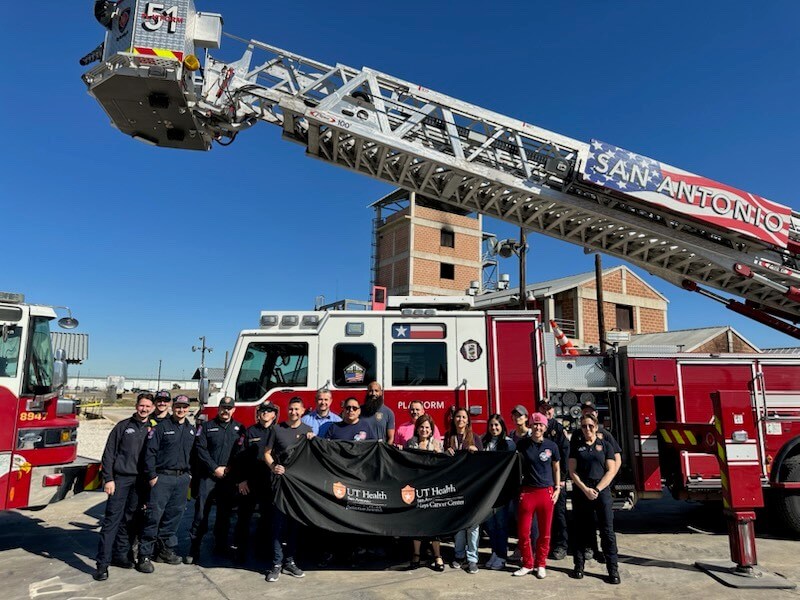Contact: Steven Lee, (210) 450-3823, lees22@uthscsa.edu
Content provided by Cliff Despres
SAN ANTONIO, April 16, 2025 – Cancer is a big concern for firefighters in San Antonio.
Firefighting is classified as a known human carcinogen by the International Agency for Research on Cancer. Occupational cancer has become the leading cause of death among firefighters. Studies have shown that firefighters face a 9% higher risk of being diagnosed with cancer and a 14% higher risk of dying from cancer compared to the general U.S. population.
Within the San Antonio Fire Department (SAFD), more than 70 firefighters have been diagnosed with cancer in the past 10 years, including leukemia to multiple myeloma and cancers of the brain, thyroid, colon, prostate and testicles. Many cases also go unreported.
To help reduce the cancer risk among firefighters and emergency medical services personnel, SAFD, UT Health San Antonio and Sylvester’s Firefighter Cancer Initiative at the University of Miami have partnered to launch the San Antonio Firefighters Cancer Prevention Program. The program aims to better understand and reduce the burden of cancer among local first responders.
SAFD, which includes more than 1,800 fire and emergency personnel serving a population of over 1.4 million residents, created its Occupational Cancer Committee to address the issue.
In 2024, the committee began working with UT Health San Antonio’s Institute for Health Promotion Research and its Mays Cancer Center’s community outreach and engagement team. Together, they also partnered with Sylvester’s Firefighter Cancer Initiative, which began in 2015.

Now, the San Antonio Firefighters Cancer Prevention Program has started work.
“Our UT Health San Antonio team is already connecting with firefighters by sharing educational resources at SAFD health fairs,” said Amelie G. Ramirez, DrPH, MPH, director of the Institute for Health Promotion Research and associate director of community outreach and engagement at the Mays Cancer Center.
The program has also initiated an immediate response system with the Mays Cancer Center to provide cancer care referrals to firefighters who receive a cancer diagnosis.
“Our goal is to strengthen cancer prevention, education and expert care for the incredible firefighters and emergency responders who dedicate their lives to protecting our community,” Ramirez said.

The San Antonio Firefighters Cancer Prevention Program is planning many future activities, including:
- Exploring the opportunity to launch an annual cancer risk assessment study based on the national firefighter annual cancer cohort study of Sylvester’s Comprehensive Cancer Center
- Tailoring Miami’s Firefighter Cancer Initiative educational resources for San Antonio firefighters and hosting educational sessions with the SAFD
- Developing an additional referral and navigation system to connect SAFD firefighters to UT Health San Antonio and Mays Cancer Center providers for early cancer screening, diagnosis and survivorship programs
- Connecting SAFD firefighters to cancer clinical trials and research studies at Mays Cancer Center
- Identifying opportunities to advise the National Institute for Occupational Safety and Health (NIOSH) and other relevant stakeholders on a strategy to collect Firefighter Cancer Registry data
- Collaborating with SAFD leaders to train UT Health San Antonio primary care providers on the unique screening needs and potential occupational or environmental exposures relevant to firefighters or emergency service personnel
San Antonio Firefighters Cancer Prevention Program program members include:
- From the SAFD Occupational Cancer Committee: Brian O’Neill, PhD, Deputy Fire Chief; Hoyt Foster Allen Jr., Firefighter (Engineer); Shane George, Firefighter (Engineer), Daniel Phillip Barto, Firefighter (Lieutenant); Carlos Esquivel, Firefighter (Lieutenant); Rachelle Hamblin, MD/MPH, Retiree Police and Firefighter Clinic at Roosevelt Wellness Center, Health by Design, San Antonio; Amanda Blackwood, Firefighter; Christina Ashton, Firefighter; Gina Murray, Firefighter (Engineer); Brandon Murray, (Deputy Fire Chief); Nickolas Gomez, Firefighter (Lieutenant); Matthew Lodge (Safety Division Chief); Martin De La Rosa, Firefighter; Ryan Westerhoff, Firefighter (Lieutenant); Will Ripps, Firefighter (Engineer); Betsy Dose, SAFD Wellness Center
- From UT Health San Antonio and Mays Cancer Center: Amelie G. Ramirez, DrPH, MPH, Director, Institute for Health Promotion Research, UT Health San Antonio, Associate Director, Community Outreach and Engagement, Mays Cancer Center; Rebecca Jones, PhD, Institute for Health Promotion Research, UT Health San Antonio, Assistant Director, Community Outreach and Engagement, Mays Cancer Center; Derek Rodriguez, PhD, Institute for Health Promotion Research, UT Health San Antonio; Ramon Cancino, MD, Executive Director, Primary Care Center; Lei Zheng, MD, PhD, Executive Director, Mays Cancer Center; Susan Padalecki, PhD, Associate Director for Research Administration, Mays Cancer Center
- From the Sylvester Comprehensive Cancer Center: Erin Kobetz-Kerman, PhD, MPH, Director and Principal Investigator, Sylvester’s Firefighter Cancer Initiative, Alberto J. Caban-Martinez, PhD, Deputy Director and Investigator, Sylvester’s Firefighter Cancer Initiative; Natasha Schaefer Solle, PhD, Deputy Director and Investigator, Sylvester’s Firefighter Cancer Initiative
Ramirez said collaborators are unified in the goal to boost the well-being of local safety personnel.
“Firefighters dedicate their service and their lives to protect us. We should work just as hard to reduce and prevent cancer within the firefighter community,” Ramirez said.
Disclaimer
The views and conclusions contained in this document are those of the authors and should not be interpreted as representing the opinions or policies of the City of San Antonio. Mention of trade names or commercial products does not constitute their endorsement by Government.
The University of Texas Health Science Center at San Antonio (UT Health San Antonio), a primary driver of San Antonio’s $44.1 billion health care and biosciences sector, is the largest academic research institution in South Texas with an annual research portfolio of more than $436 million. Driving substantial economic impact with its six professional schools, a diverse workforce of more than 9,400, an annual expense budget of $1.67 billion and clinical practices that provide 2.5 million patient visits each year, UT Health San Antonio plans continued growth over the next five years and anticipates adding more than 1,500 higher-wage jobs to serve San Antonio, Bexar County and the South Texas region. To learn about the many ways “We make lives better®,” visit UTHealthSA.org.
Stay connected with The University of Texas Health Science Center at San Antonio on Facebook, Twitter, LinkedIn, Instagram and YouTube.
The Mays Cancer Center at UT Health San Antonio is one of only four National Cancer Institute-designated Cancer Centers in Texas. The Mays Cancer Center provides leading-edge cancer care, propels innovative cancer research and educates the next generation of leaders to end cancer in South Texas. To learn more, visit https://cancer.uthscsa.edu.
Stay connected with the Mays Cancer Center on Facebook, Twitter, LinkedIn, Instagram and YouTube.
The Institute for Health Promotion Research (IHPR) investigates the causes of and solutions to the unequal impact of cancer, chronic disease and obesity among Latinos in San Antonio, South Texas and the nation. The IHPR, founded in 2006, is based at The University of Texas Health Science Center at San Antonio.


